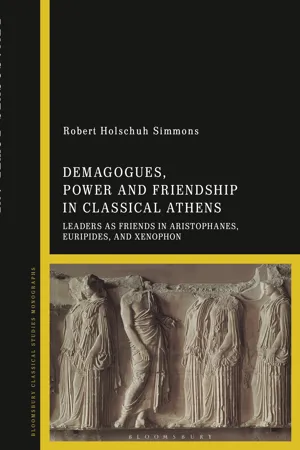
Demagogues, Power, and Friendship in Classical Athens
Leaders as Friends in Aristophanes, Euripides, and Xenophon
- 192 pages
- English
- ePUB (mobile friendly)
- Available on iOS & Android
Demagogues, Power, and Friendship in Classical Athens
Leaders as Friends in Aristophanes, Euripides, and Xenophon
About This Book
What makes a demagogue? A much more friendly touch, or more importantly, a perception of a friendly touch, than has previously been explored. Demagogues, Power and Friendship in Classical Athens examines the ways in which a demagogic leadership style based on personal connection became ingrained in this period, drawing on close study of several genres of literature of the late 5th and early-to-mid 4th centuries BCE. Such connection was particularly effective with lower classes of Athenians, who had been accustomed to being excluded from politicians' friendship-based approaches to coalition-building. Comedies of Aristophanes (particularly Knights), tragedies of Euripides (particularly Iphigenia in Aulis ), and historical biographies of Xenophon (particularly Anabasis and Cyropaedia ) depict demagogues, or characters exhibiting demagogic characteristics, using a style of outreach to members of neglected classes that involved provoking feelings of friendship with individuals in these classes, whether the demagogues and individual supporters actually interacted closely or not. These leaders employed techniques, such as propinquity, homophily, and transitivity, that both contemporary sociologists (and, in some cases, Aristotle) recognize as effective for such purposes. Particular attention is paid to discrepancies in Aristophanes' Knights between how the demagogue Cleon is hyperbolically portrayed (as a pederastic lover of the Athenian people) and how his language and actions make him out – as a friend of theirs, as he likely portrayed himself.
Frequently asked questions
Information
Table of contents
- Cover
- Half-Title Page
- Dedication
- Series Page
- Contents
- Acknowledgments
- List of Abbreviations
- Introduction
- 1 Friendship in Athenian Politics Prior to the Demagogues
- 2 Cleon and the Rise of Friendship-Based Athenian Demagogy
- 3 The Sociology of Making Individual Philoi among the Masses
- 4 Distinguishing Desire from Friendship in Leadership Models in Aristophanes’ Knights
- 5 Later Developments of the “Leader as Philos” Model
- Conclusion: Cleon and the Legacy of Leadership by Friendship
- Notes
- Works Cited
- Index
- Copyright